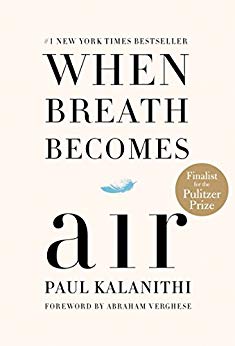

This article is an excerpt from the Shortform summary of "When Breath Becomes Air" by Dr. Paul Kalanithi. Shortform has the world's best summaries of books you should be reading.
Like this article? Sign up for a free trial here .
What is the end of life cancer experience like? No one can really say for sure- every person is different. But Paul Kalanithi hoped to say something in his final days.
Paul Kalanithi worked on his memoir, When Breath Becomes Air for as long as he could while battling an end of life cancer diagnosis. When Paul eventually passed away, his wife, Lucy, completed his manuscript. She claims that Paul’s legacy, like his manuscript, was unfinished, but they both hoped he could continue to help people even after the end of his life from cancer.
Shortform note: This article and our summary of When Breath Becomes Air is written in a way that allows you to share in the experience provided by the memoir.
Simply reading about the content of the story seems insufficient in expressing the emotional journey. To really provide you with the sensation this book creates, we wrote in the first person, using a voice similar to his. We highly recommend reading the original book for the full experience. Reading the words coming directly from him is a powerful experience we can’t replace.
Paul’s Final Memories
Shortform note: Paul Kalanithi was diagnosed with an end of life cancer, or terminal cancer, when he was in his thirties and completing his residency. After his diagnosis, Paul strove to document his end of life cancer experience because he was a person who believe in purpose and a person’s own values. At the end of life, cancer has many side effects, but Paul continued to write for as long as he could.
Time has lost its meaning and luster for me. Each moment moves me farther away from the last relapse. But that same moment is another step toward another one or the final one. Death may still be far off, but I am certain it is not as far off as I would like. With this knowledge, it would be easy to try to cram as much “living” as I can into the time I have left. But cancer is a fickle companion. It doesn’t necessarily take away your time as fast as you think it will, but it makes your body too weak to enjoy it the way you’d like.
There is little to differentiate the days now. If time was arbitrary when I was operating, now it was meaningless. The time of day holds no weight, nor does the knowledge of whether it is Tuesday or Friday. I am static. I am simply existing.
I also don’t know how to think of myself, what tense to use. Was I or am I a doctor? Or perhaps I should think I was previously a neurosurgeon and might be one in the future? Graham Greene stated that you live for 20 years and reflect for the rest. Is this life, then, a reflection of the past already?
Most people either fulfill their hopes or leave them behind. Both states are past; thus, the future becomes the present. My present is all the future I have, but that is not the case for my daughter. I hope to be around for enough time that she will remember me. There are so many things I want to share with her, but writing them down feels presumptuous. I have no inkling of who she will be and what will be important to her.
In this place, where our lives intersect for a brief moment of time, I can only think of one appropriate message to leave her with: when life dictates you gather the evidence of your worth, as it will at various times, remember that by living, you helped me live. It is of no small consequence that you brought a peaceful calm to my dying days, one like I had never known. The joy you gave me is enough, and never doubt that it was everything.
After His Death
Shortform note: Paul’s wife Lucy offers additional details on the end of life cancer experience of Paul, and lets readers know that he was in the company of loved ones. At the end of his life, Paul wanted to be with his baby daughter, Cady,
Paul’s treatment stopped working a few months earlier, at Christmas. He became weaker but kept living as best as he could. They had friends over for dinner, played with Cady, and continued to enjoy each other’s love and companionship. Paul also worked on this book. During his last months, finishing the book was of the utmost importance to him.
The transition to spring brought a resurgence of life in the natural world while Paul’s life continued to wane. In February, he was put on oxygen to help his breathing. More scans were done, showing the growing grip of the cancer in his lungs and the spreading of it to his brain. The new brain tumors brought a shortened life expectancy and would eventually lead to neurological deficits.
The ensuing deterioration of his mind was particularly crushing for Paul, fearing the loss of meaning and independence. Thwarting these devastating effects became the main goal of whatever treatment he would receive.
Lucy remained strong for Paul, but on the inside, her heart was breaking. She didn’t know how much time they had left together, but she never thought it would only be a matter of days.
For his final weekend, Paul’s family came to their house and spent time with him and Cady. Paul knew he wasn’t likely to finish his manuscript either due to time or his physical capacity. But he still put it aside that day, preferring to be present with his family.
The family was hoping Sunday would bring more of the same. More time to relax and enjoy each other’s company, maybe go to church. But Paul spiked a fever and slept for most of the day. By Sunday night, Paul’s health took a dramatic turn. He couldn’t breathe and was taken to the ER. He knew, as they all did, he was unlikely to leave the hospital again.
The doctors suggested intubating him, and Paul and Lucy discussed and struggled over the decision. Intubation would keep him alive, but at what cost? Could his current ailments improve to a point where he could come off ventilation? Or would he continue to deteriorate, his brain and organs shutting down?
The other option was comfort care, an action that was certain to lead to rapid death. Paul’s main question regarded his quality of life even if he was able to recover from the respiratory issues. With the cancer in his brain, was there a good reason to lengthen his time if he would not be lucid enough for it to have meaning? He signed a “Do Not Resuscitate” and decided to sleep on it.
In the morning, his attention turned again to comfort care and the possibility of dying at home. But Lucy knew his condition was delicate and that he might not make it home. It was decided that she would bring home to him. The only thing he wanted was Cady.
Paul lay with Cady in his arms while the doctors commiserated over what was left to do. But Paul knew what he wanted. He turned to Lucy and said, “I’m ready.”
Surrounded by his family, Paul became emotional as he communicated his love and gratitude. Before the supplemental oxygen was removed and morphine injected, Paul asked his family to ensure this book was published. He also told Lucy he loved her one final time.
After another hour, Paul drifted into unconsciousness. Eventually, he inhaled and breathed out the last breath he would ever take.
Shortform note: Reading about the end of life cancer that cause someone’s death can be a harrowing experience. Paul continued to write it for as long as he could, hoping to leave something of himself behind. The end of life cancer experience is documented by Paul and his family and was published posthumously, and is a way to honor Paul’s legacy.

———End of Preview———
Like what you just read? Read the rest of the world's best summary of Dr. Paul Kalanithi's "When Breath Becomes Air" at Shortform .
Here's what you'll find in our full When Breath Becomes Air summary :
- How Paul Kalanithi discovered he had cancer
- How Paul coped with his cancer until his very end
- How Paul's wife dealt with his death and found the strength to continue






